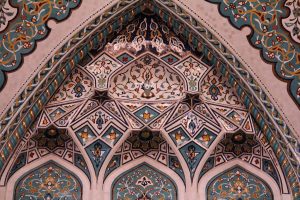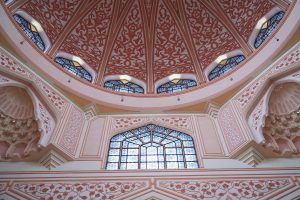Originally posted 2020-02-15 00:55:31.
After the noble Caliphate of Abu Bakr, Umar and Uthman (may God be pleased with them) much turmoil and bloodshed befell the Muslim nation from within.
Sadly, after the assassination of Ali (may God honor his face) and martyrdom of Hussein (master of the youth in heaven), it was the progeny of Prophet Muhammad (peace be upon him) and his close Companions who called for a better leadership.
Some called for it in a strictly political way and others called for military revolt. This brought upon them many onslaughts and assassinations from the Islamic Caliphate which had become like a kingdom where the rule is handed down through the family of Bani Ummayyah.
This turmoil amongst the Muslims caused Jafar Al-Sadiq to dislike politics and made him unconcerned with the Caliphate.
Instead, he focused on science and Islamic knowledge. This isn’t because of any weakness in him; it was simply because he held the opinion as the heavy majority of other scholars that taking up arms on the Muslim government leads to a blinding mayhem, oppression, spreading of lies and violating peoples honor and dignity.
Jafar Al-Sadiq was a wise man with a calm observant manner about him. He was always engulfed in deep thought and contemplation. These qualities led him to become one of the well respected scholars and thinkers in history. His honor and fame among his time was more than that of the political powerhouses.
His Birth and Upbringing
He was born infar 702 Common Era in Madinah, city of the Prophet, in the blessed month of Ramadan. Jafar is the son of Muhammad son of Ali son of Hussein son of Fatimah daughter of the Prophet Muhammad. He was raised in this blessed environment by a very pious mother and his father who was a great scholar.
He also learned from his grandfather from his mother’s side who is Qasim son of Muhammad son of Abu Bakr. He also learned from the other great scholars of Madinah. He later traveled to Iraq and was very diligent in seeking knowledge on Jurisprudence and the differences of opinion, Qur’anic Sciences, as well as Hadith and its sciences.
His Work in Chemistry
He also became a scholar in Chemistry. He spent time learning the laws of chemistry and other worldly like biology and geology. History doesn’t tell us where he learned this from, but we know that the famous scholar Jabir ibn Hayyan learned from him. We have this knowledge from various books of history and by different authors.
He distanced himself from politics. He lived a life far from the difficult strains of the political climate of his time. Because of this he steered clear of much of the oppression that came at the hands of the Umayyahs upon the progeny of the Prophet who claimed rightful leadership of the Islamic State oftentimes by insurgency.
Jafar lived with honor and dignity despite the turmoil and chaos afflicting the Muslims in his time. He was invited, but never took part in any resistance to the Caliphate. This is established in the book Al-Milal wa An-Nihal by Ash-Shahrastani when he says: ‘He never interfered with the rulers’.
Even though he didn’t involve himself in this turmoil, the Caliph Al-Mansur became worried about him specifically. He began to fear him when he heard of how many people studied with him and how much they respected his great knowledge and eminence. So Al-Mansur sent spies to go and observe him as much as possible. The problem is that one of the reasons people loved him is his simplicity. His only two concerns were knowledge and worship.
His Zeal and Fervor for Knowledge
Imam Jafar was a great scholar of fiqh (Islamic Jurisprudence) known for his ability to extract rulings from the many texts without following the particular methodology of his father or any other scholar. He was a mujtahid (someone who forms legal rulings through his mastery of the Arabic language, Quran, Sunnah as well as the opinions of the Companions of the Prophet).
He was also one of the first to site fundamental principles based in the Arabic language in dealing with the texts. He was known for establishing the now universal rule that the basic rule of all things and actions is permissibility unless there is a prohibition in the Quran or Sunnah. He didn’t use analogy because he was shy of using his opinion in a given matter. In other words he relied on the texts.
He taught many of the great scholars Abu Hanifah and Imam Malik and his son Musa Al-Kazhim. He was praised by many of the scholars of Hadith as well and all of them preferred his narration over others. You will find in many books of Hadith and Quranic exegesis `An Jafar ibn Muhammad. Ibn Hibban the great scholar of Hadith said about him ‘He was one of the great members of the family of the Prophet known for his knowledge and virtue.
His Opinion of Abu Bakr and Umar
 It was also his practice to exalt the Companions of the Prophet especially Abu Bakr and Umar. It is narrated by Salim ibn Abi Hafsah: “I asked Muhammad and his son Jafar their opinion about Abu Bakr and Umar. Abu Jafar said: ‘be loyal to them and disavow their enemies because those two were the leaders of true guidance’. Then Jafar said: ‘O Salim, would a man slander his grandfather?’ This is because Abu Bakr is the grandfather of Jafar from his mother’s side. If I were to say such a thing then I would be prevented the intercession of the Prophet Muhammad on the Day of Judgment.
It was also his practice to exalt the Companions of the Prophet especially Abu Bakr and Umar. It is narrated by Salim ibn Abi Hafsah: “I asked Muhammad and his son Jafar their opinion about Abu Bakr and Umar. Abu Jafar said: ‘be loyal to them and disavow their enemies because those two were the leaders of true guidance’. Then Jafar said: ‘O Salim, would a man slander his grandfather?’ This is because Abu Bakr is the grandfather of Jafar from his mother’s side. If I were to say such a thing then I would be prevented the intercession of the Prophet Muhammad on the Day of Judgment.
His Guidance and Direction
Imam Jafar left us with some wise direction which is close to some of the wisdom found in the Sunnah of the Prophet. This is a blessing Almighty God gives the deeply faithful and virtuous. We find many of these sayings in the books of Shi`ah (Shiite), but we will mention a few from verified authentic sources. One of the best is his commands to his son at the end of his life:
’O my son, Whoever is content with that which they are given (of sustenance) has become rich, And whoever was concerned about what others have dies as a poor man, And whoever was not content with that which he was given has charged Almighty God’s will (with injustice), and whoever held in contempt the mistakes of others is presumptuous about his own mistakes, whoever reveals the faults or shortcomings of others has uncovered a major fault of his own, whoever unsheathed his sword in tyranny or aggression is killed by it (that sword), whoever digs a hole (plots against) for his brother (in humanity) to fall in (for his demise) then God will make him (the plotter) fall in it (the hole to his demise), O my son, live according to the Qur’an, spread peace, be a promoter righteousness, be a deterrent to evil, and to whoever severs their ties with you make amends and be good to them, and whoever stops talking to you then convey a nice greeting to them.
’There is no better sustenance than God-consciousness, there isn’t a better action than silence, there is no greater enemy than ignorance and no disease worse than lying.
‘Whoever doesn’t control their anger doesn’t control their intellect.’
His Death
Imam Jafar Al-Sadiq was one of the greatest personalities in the history of Islam. He had a strong impact with his great knowledge, eminent character, and wisdom. This was the characteristic of many of the scholars of the early generations of the Prophet’s family and close companions.
He remained as a reference of knowledge in the city of the Prophet (Madinah) until he passed away in 765 C.E. at 63 years old and was buried in Al-Baqi` next to his father and grandfather along with the greatest of the Prophet’s companions.
May God be pleased with Jafar Al-Sadiq and all the grandchildren of the Prophet (peace be upon him).


